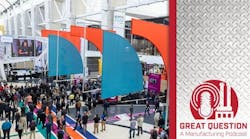Podcast: What's Trending at IMTS 2024?
This year, over 84,000 attendees are at the 2024 International Manufacturing Technology Show (IMTS) in Chicago, Illinois. Joining them are Robert Schoenberger, editor-in-chief of IndustryWeek; Thomas Wilk, editor-in-chief of Plant Services; Robert Brooks, editor-in-chief of American Machinist and Foundry Management & Technology; and Sharon Spielman, Technical Editor at Machine Design.
This year’s event offers 1.2 million square feet of exhibit space, with 1,816 exhibiting companies and over 7,600 people attending educational events.
If you couldn’t make it to this year's event, don’t worry. We've got you covered. In this special episode of Great Question: A Manufacturing Podcast, our editors share what they've seen, learned, and experienced live from the show floor.
Below is an excerpt from the podcast:
RS: So, Tom, let's turn it over to you. You've been walking around all day, the past couple days. What have you seen that caught your eye?
TW: You know, it's a huge show, and I think it's interesting because my magazine focuses on the industrial asset management community. At this show, representing are a lot of CMMS companies. And I thought it was interesting that companies like Brightly, Limble, UpKeep, and MaintainX, they are all here to serve the market that IMTS serves, which is machine cutters, metal cutters, and additive manufacturing. I think one of the interesting things that I learned is that the market for CMMS services to manage your work orders, to manage your maintenance work, to develop an online history, this is a market which is really right for that kind of service. There are lots of people who may not have their critical assets, their CNC machines, stored in the CMMS. I've heard a lot of stories of people who, when they’ve put their work orders together, they've used pen and paper, or they stack up the sheets of paper on the corner of a desk and simply pass them out. This is a market which is being served very well by these automated work order management systems.
The other thing that I've noticed is that we do a lot of content focused on compressed air systems, the systems that power other machines. I visited Kaeser Compressors today, as well as Sullair/Hitachi Global Air Power, and both of those companies have some interesting products they are rolling out. Kaeser is focusing these days especially on adding sensors to their compressor equipment to help these machinists understand better the quality of the air that's powering these other assets, whether there is water getting into the air, whether there's oil from the compressor getting into the air. Kaeser is now well on the way to offering this monitoring as a service as part of their compressor offerings.
This podcast originally ran as Podcast: Top trends from IMTS 2024 — Emerging manufacturing tech, educational innovations, and more on Plant Services, an Endeavor Business Media partner site.
About the Podcast
Great Question: A Manufacturing Podcast offers news and information for the people who make, store and move things and those who manage and maintain the facilities where that work gets done. Manufacturers from chemical producers to automakers to machine shops can listen for critical insights into the technologies, economic conditions and best practices that can influence how to best run facilities to reach operational excellence.
Listen to another episode and subscribe on your favorite podcast app
About the Author
Robert Schoenberger
Editor-in-Chief – IndustryWeek, Endeavor Business Media
Robert Schoenberger has been writing about manufacturing technology in one form or another since the late 1990s. He began his career in newspapers in South Texas and has worked for The Clarion-Ledger in Jackson, Mississippi; The Courier-Journal in Louisville, Kentucky; and The Plain Dealer in Cleveland where he spent more than six years as the automotive reporter. In 2013, he launched Today's Motor Vehicles, a magazine focusing on design and manufacturing topics within the automotive and commercial truck worlds. He joined IndustryWeek in late 2021.
Editorial Mission Statement:Manufacturing is an endlessly fascinating world. Nearly every object that we touch or use daily came out of a factory and is the result of design, engineering, procurement, supply chain, inventory control, and management processes. My goal is to keep leaders in the $42 trillion manufacturing world up to date on developments in their industry in ways that inform and entertain them without wasting their time.
Why I Find Manufacturing Interesting:
Several years ago, I visited a plant in Pennsylvania that used laser equipment to etch fine lines in large plastic injection molds used to create dashboards on cars. The laser-etched lines created the faux-leather pattern on the dashboard, a vast improvement of the photochemical process that automotive suppliers had used for decades to create the illusion of natural products. The idea that designers had crafted the faux-leather patterns, that engineers had developed machines that could generate the fine lines needed, that machine shops could cut the complex shape of the dashboard into the mold shape—all for an aesthetic feature in a car that most drivers would never consciously notice (but the car would feel odd in its absence)—drove home the massive amount of human effort that goes into everything produced with modern machinery.
Tom Wilk
Editor in Chief, Plant Services – Endeavor Business Media
Tom Wilk is the Editor in Chief of Plant Services, an Endeavor Business Media partner site.
Previously, Tom was a Technical Writer and a Social Media Manager for Panduit as well as a Senior Technical Editor for Battelle Memorial Institute.
Robert Brooks
Editor/Content Director - Endeavor Business Media
Robert Brooks has been a business-to-business reporter, writer, editor, and columnist for more than 20 years, specializing in the primary metal and basic manufacturing industries. His work has covered a wide range of topics including process technology, resource development, material selection, product design, workforce development, and industrial market strategies, among others.
Currently, he specializes in subjects related to metal component and product design, development, and manufacturing—including castings, forgings, machined parts, and fabrications.
Brooks is a graduate of Kenyon College (B.A. English, Political Science) and Emory University (M.A. English.)


